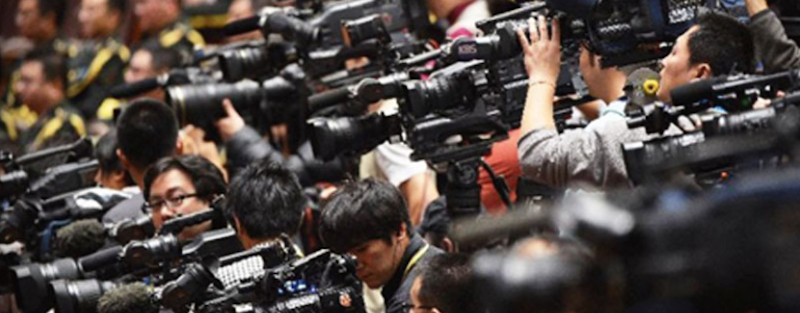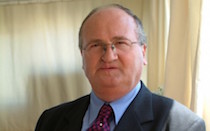Hol Dir den wöchentlichen SPARTANAT-Newsletter.
Dein Bonus: das gratis E-Book von SPARTANAT.

Martin van Creveld: Wissenschafter, Journalisten, Spione
Hier ist eine Geschichte, die ich vor vielen Jahren gehört habe. Jemand fragte den US Präsident Lyndon Johnson einmal, wie wichtig die verschiedenen Geheimdienste – von denen die USA ja eine Menge besitzen – denn für seine Arbeit seien.
Hier ist eine Geschichte, die ich vor vielen Jahren gehört habe. Jemand fragte den US Präsident Lyndon Johnson einmal, wie wichtig die verschiedenen Geheimdienste – von denen die USA ja eine Menge besitzen – denn für seine Arbeit seien. Seine Antwort? Ich habe von den Geheimdienstlern nie etwas erfahren, was ich nicht auch am nächsten Tag in der New York Times lesen konnte. Und dafür gibt es einen Grund, hätte Johnson hinzufügen sollen. Agenten im Nachrichtendienst sind Experten darin, Informationen zu sammeln. Dasselbe gilt für Journalisten. Der Unterschied ist, dass Letztere in der Regel bessere Arbeit leisten.
Die Geschichte kann wahr sein oder auch nicht. Angenommen sie ist es, könnte Johnson gemeint haben, was er gesagt hat. Oder er spielte absichtlich die Rolle der Geheimdienste herunter um zu verbergen, dass er mehr wusste; Immerhin soll es eine seiner herausragenden Qualitäten gewesen sein, sich zu Verstellen. Mir fallen noch einige andere Interpretationen ein. Egal. Wir werden es wohl nie wissen.
Warum diese Geschichte? Weil ich vor einiger Zeit das Privileg hatte, einen Vortrag in Jerusalem zu halten. Mein Thema lautete: „Was wurde aus der iranischen Bedrohung?“. Ein wahrhaftes Rätsel, angesichts der unzähligen Gelegenheiten bei denen Premierminister Netanyahu darauf aufmerksam machte; nicht zu vergessen seine wiederholten Drohungen, den Iran zu bombardieren, um ihn vom Bau einer Bombe abzuhalten. Ich nutzte die Gelegenheit, um – wie schon oft – zu argumentieren, dass die nukleare Bedrohung meines Landes durch den Iran größtenteils ein Mythos war. Ich musste während meines Vortags nicht auf Q&A warten, um zu wissen, was in den Köpfen meiner Zuhörer vorging – ich hatte diese Situation schon viele Male erlebt. Haben Sie, als Wissenschafter, Zugang zu Geheimdienst-Informationen? Nein, habe ich nicht (und ich glaube das wollte ich auch nicht; Der Zugang zu solchen Informationen schafft ganz eigene Beschränkungen und Zwänge). Woher wissen Sie dann, was Sie behaupten zu wissen? Eine gute Frage; und eine, auf die ich hier eingehen will.
Ich nutzte die Gelegenheit, um – wie schon oft – zu argumentieren, dass die nukleare Bedrohung meines Landes durch den Iran größtenteils ein Mythos war. Ich musste während meines Vortags nicht auf Q&A warten, um zu wissen, was in den Köpfen meiner Zuhörer vorging – ich hatte diese Situation schon viele Male erlebt. Haben Sie, als Wissenschafter, Zugang zu Geheimdienst-Informationen? Nein, habe ich nicht (und ich glaube das wollte ich auch nicht; Der Zugang zu solchen Informationen schafft ganz eigene Beschränkungen und Zwänge). Woher wissen Sie dann, was Sie behaupten zu wissen? Eine gute Frage; und eine, auf die ich hier eingehen will.
Erstens: Ich behaupte nicht auch nur ansatzweise soviel darüber zu wissen wie viele Zentrifugen der Iran besitzt, wo diese sich befinden, unter wie vielen Metern Zement sie versteckt liegen, wie viel angereichertes Uran das Land hergestellt hat, etc. wie die Geheimdienste. Ich bin zum größten Teil auf Journalisten angewiesen, die selbst viele ihrer Informationen von Spionen erhalten, welche wiederum ihre eigene Agenda verfolgen wenn sie etwas zu einem bestimmten Zeitpunkt und in einem bestimmten Format veröffentlichen.
Zweitens: Solche Informationen – gleich wie zutreffend sie sein mögen – sind, für sich genommen, bedeutungslos. Um sie zu verstehen, muss man zuerst weitergreifende Fragen beantworten. Wie beispielsweise die nach den Ursprüngen für das Verhalten des Iran; Nach seinen Zielen; Und nach seinen Einschränkungen. Kurz, Fragen bezüglich seiner nationalen Strategie und der Rolle, die sein Nuklearprogramm in dieser Strategie spielt. Im Hinblick auf diese Sachverhalte sind die Informationen, die den Wissenschaftern zur Verfügung stehen, oft genau so gut wie, wenn nicht sogar besser als, jene der Spione oder auch der Journalisten.
Drittens: Wenn es um noch allgemeinere Fragen geht, wie die Auswirkungen von Kernwaffen auf internationale Beziehungen, Abschreckungswirkung, Aufrüstung und so weiter, sind Wissenschafter zum Teil besser informiert als Spione oder Journalisten. Denn Angehörigen dieser beiden Berufsgruppen haben selten die Zeit, sich so ausführlich mit solchen Problemen zu befassen, wie sie es sollten. Viertens: Spione und die Agenturen, für die sie arbeiten, stehen oft unter politischem Druck, den Entscheidungsträgern das zu sagen, was diese hören wollen. Ein herausragendes, ja, ungeheuerliches, Beispiel dafür war der Versuch der Clinton- und Bush-Regierungen zu „beweisen“, dass der Irak Massenvernichtungswaffen besitzt. Was haben sie nicht alles getan, welche Geschichten haben sie nicht erfunden! Von mobilen Laboren zur Herstellung von Keimen und weiß Gott was sonst noch. Ich hatte einmal das Vergnügen, eine Stunde mit Hans Blix, dem UN-Beauftragten und Leiter des Teams, das die Waffen finden sollte, zu verbringen. Er berichtete mir, wie er es auch anderen berichtet hat, wie die Amerikaner es anstellten. Wissenschafter, die in einem akademischen Umfeld arbeiten, laufen viel weniger Gefahr, unter solchen Druck zu geraten.
Viertens: Spione und die Agenturen, für die sie arbeiten, stehen oft unter politischem Druck, den Entscheidungsträgern das zu sagen, was diese hören wollen. Ein herausragendes, ja, ungeheuerliches, Beispiel dafür war der Versuch der Clinton- und Bush-Regierungen zu „beweisen“, dass der Irak Massenvernichtungswaffen besitzt. Was haben sie nicht alles getan, welche Geschichten haben sie nicht erfunden! Von mobilen Laboren zur Herstellung von Keimen und weiß Gott was sonst noch. Ich hatte einmal das Vergnügen, eine Stunde mit Hans Blix, dem UN-Beauftragten und Leiter des Teams, das die Waffen finden sollte, zu verbringen. Er berichtete mir, wie er es auch anderen berichtet hat, wie die Amerikaner es anstellten. Wissenschafter, die in einem akademischen Umfeld arbeiten, laufen viel weniger Gefahr, unter solchen Druck zu geraten.
Kurz gesagt, Spione haben ihre Vorteile. Sie sind ein Muss für jede Regierung, das Militär, und sogar große Unternehmen. Aber sie können nicht selbstständig agieren. Zum Teil wissen das die Geheimdienste selbst. Warum würden sie sonst sowohl „Analytiker“ als auch „Sammler“ rekrutieren, ausbilden, und einsetzen?
Ich selbst habe Erfahrung damit gemacht. Über die Jahre nahm ich an zahlreichen Treffen mit Geheimdienstmitarbeitern und Journalisten aus der ganzen Welt teil. Einige davon besuchten mich in meinem Heimatort nahe Jerusalem nur um bestimmte Themen mit mir zu besprechen. Darunter auch Geschehnisse in Ländern wie Afghanistan und Irak. Immer wieder habe ich meine Überraschung darüber zum Ausdruck gebracht, dass sie, die in diesen Ländern gewesen waren, mich, der es nicht war, aufsuchten. Die Antwort, die ich bekam, war immer die gleiche: Sie können uns erklären was wir gesehen, gehört, und erlebt haben, indem Sie uns den Kontext erläutern.
Dazu kann ich nur „Amen“ sagen.
 MARTIN VAN CREVELD, einer der führenden Militärhistoriker der Gegenwart, wurde 1946 in Holland geboren. Seit 1950 lebt er in Israel. Er studierte an der London School of Economics und an der Hebrew University in Jerusalem, wo er seit 1971 als Professor für Geschichte lehrt. Bücher u.a.: „Kampfkraft“, „Gesichter des Krieges“, „The Sword and the Olive“, „Aufgang und Untergang des Staates“,… Darüber hinaus ist er als militärischer Berater und Referent in der gesamten westlichen Welt tätig.
MARTIN VAN CREVELD, einer der führenden Militärhistoriker der Gegenwart, wurde 1946 in Holland geboren. Seit 1950 lebt er in Israel. Er studierte an der London School of Economics und an der Hebrew University in Jerusalem, wo er seit 1971 als Professor für Geschichte lehrt. Bücher u.a.: „Kampfkraft“, „Gesichter des Krieges“, „The Sword and the Olive“, „Aufgang und Untergang des Staates“,… Darüber hinaus ist er als militärischer Berater und Referent in der gesamten westlichen Welt tätig.
Martin van Creveld im Internet: www.martin-van-creveld.com
Martin van Creveld auf SPARTANAT:
SPARTANAT ist das Online-Magazin für Military News, Tactical Life, Gear & Reviews.
Schickt uns eure News: [email protected]
Werbung
Hol Dir den wöchentlichen SPARTANAT-Newsletter.
Dein Bonus: das gratis E-Book von SPARTANAT.


